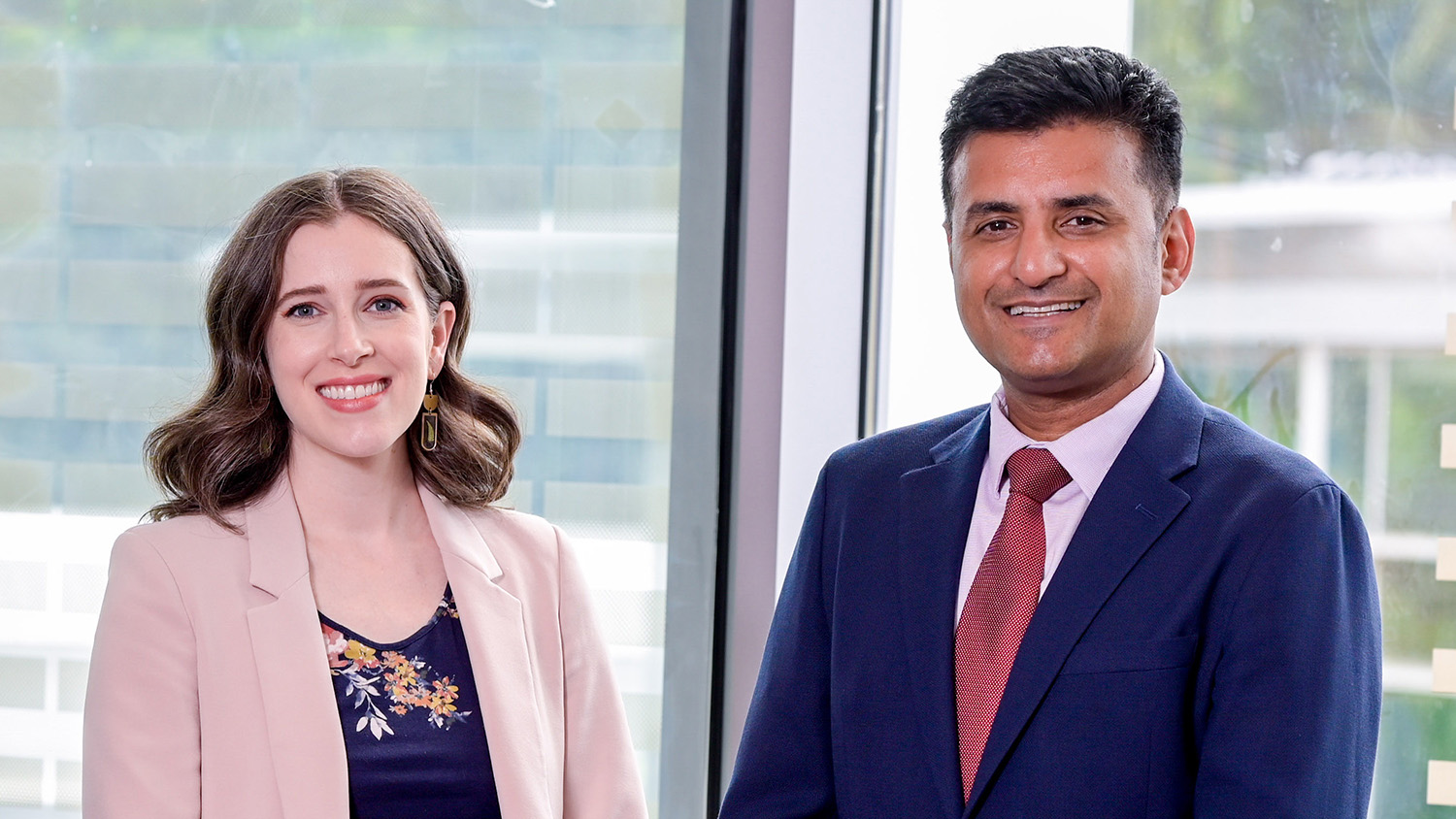Five Questions with Sid Thakur and Meredith Spence Beaulieu of the Global One Health Academy

One Health is a collaborative interdisciplinary approach to achieving optimal health outcomes that recognizes the deep connections that animals, plants, the environment and human society maintain with one another. To improve health in one area, all other areas must experience improvement. That’s where NC State’s third academy, the Global One Health Academy, comes in.
As the Earth’s population grows, people’s connection with plants, animals, biodiversity and the environment changes. Such connection is engendered by people living closer together, changes in climate and land use, greater global travel and trade, and the role of animals beyond food source. These factors impact the health of the shared environment, affect food and water supplies, and make it easier for diseases to spread between animals and people.
The Global One Health Academy engages faculty, staff, undergraduate and graduate students in improving the health of plants, animals, biodiversity and human society in North Carolina and beyond. The academy also strives to be a global health champion, lead our peers in One Health education and research, train the next generation of global health leaders, and engage with public and private partners to drive results in North Carolina and at the global level. The academy takes an interdisciplinary approach to its efforts, paving the way for advances in education, research and scientific innovation.
We spoke with Executive Director Sid Thakur (ST) and University Program Manager Meredith Spence Beaulieu (MSB) about the formation of the Global One Health Academy, its mission and vision, and where the academy is headed next.
What inspired the formation of the Global One Health Academy? What is your mission and vision?
ST: The formation of the Global One Health Academy was inspired by NC State’s holistic approach towards solving complex problems using interdisciplinary approaches. One Health, by definition, is an interdisciplinary approach to optimize the health of humans, animals, plants, the environment and biodiversity we share at the local, national and global levels. We are the only educational institution in the U.S. which is a World Health Organization Collaboration Center on One Health and antimicrobial resistance. Though we are leaders in many fields working with animals, plants, humans and the environment, many of these activities and programs were not fully integrated in the past. Leveraging its diverse partnerships, interdisciplinary faculty expertise, research and engagement activities, NC State was well positioned to integrate these efforts and form the Global One Health Academy to promote health equity for people, animals, plants and the environment worldwide.
The academy’s vision is to lead the global health field in One Health through impactful and sustainable partnerships at NC State and beyond. Our mission is dedicated to engaging and supporting faculty, staff, undergraduate and graduate students in improving the health of plants, animals, biodiversity and human society.
Since NC State is a leading land-grant university, the Global One Health Academy is committed to serve North Carolina first. Establishing the academy in the Office of University Interdisciplinary Programs in October 2022 offered a unique opportunity to extend NC State’s “Think and Do” credo to the world. A key focus of the Global One Health Academy is on student education and training. We want to increase students’ awareness of global grand challenges through hands-on experiences that will hone their professional development skills and cultural competencies. Another goal is to engage in research that addresses global health challenges by leveraging partnerships with community stakeholders and collaborating universities in the U.S. and abroad.
What is your role within the Global One Health Academy? In this role, how do you advance the academy’s mission and scholarship?
ST: As the executive director, I am entrusted to lead Global One Health-related activities across all colleges at NC State. I work closely with college leadership and my faculty colleagues to further elevate the university as a trusted source of engaged interdisciplinary research, education, training and engagement to provide world-class innovation, training and information dissemination for improved local, national and global health outcomes. I spend a lot of my time uniting researchers from different disciplines in a coordinated effort to advance research and student training. Most importantly, this is a team-based effort. All the key decisions are taken collectively, soliciting input from people representing multiple backgrounds. I am fortunate to have the support of an amazing Global One Health Academy core team, a leadership group representing all the colleges at NC State, and strong support from the Office of University Interdisciplinary Programs in the Office of the Executive Vice Chancellor and Provost to run the academy.
MSB: I’m the program manager of Global One Health Academy. I work closely with Sid to envision what the academy can be, and develop and lead programs that meet its mission of engaging the entirety of the NC State campus community in interdisciplinary One Health opportunities. This is an exciting position, as I get to be involved with facilitating cutting-edge research, novel training opportunities for undergraduate and graduate students, and effective public engagement and research translation on topics as diverse as antimicrobial resistance and sustainable agricultural development. In addition to my general role in supporting all of the academy’s activities, I also co-lead our Global One Health Fellows program with Michael Reiskind. In this role, I help organize courses, workshops, and networking opportunities that support the academic and professional development of an interdisciplinary cohort of graduate students interested in addressing challenges that affect human, animal, plant and environmental health. We’re currently in the first year of our fellows program, and I’m looking forward to watching it grow in the future.
How does the Global One Health Academy advance the strategic goals of One Health research and scholarship? Additionally, how does the Global One Health Academy use this work to provide high-quality educational and research opportunities for students?
ST: We are working hard to attract new funding opportunities for interdisciplinary faculty research relevant to three priority areas: driving food and water solutions, combating infectious diseases, and addressing climate change and health disparities. We aim to be known as an international leader in One Health education, research and engagement that addresses the 17 UN Sustainable Development Goals . The opportunities we create for students will help them broaden their horizons working with international, federal and state agencies, non-profits and industries involved in global health activities. We launched our graduate Global One Health Fellows program late last year, and received 83 applications from graduate students representing eight colleges at NC State. This fact alone highlights how the One Health model appeals to students from different backgrounds. Based on the interest in our Fellows program, we plan to embark on developing similar training opportunities at the undergraduate level under the leadership of Kristen Sullivan. Creating an ecosystem of opportunities for undergraduate and graduate students to engage in interdisciplinary One Health training will be a unique feature at NC State.
MSB: The primary attribute of the Global One Health Academy, and the academies in general, that allows us to drive innovation in research and scholarship is a foundation in interdisciplinarity. By connecting researchers in diverse disciplines across NC State around common themes, we can synergize creative research efforts that have potential to meaningfully impact pressing global challenges. We spend a lot of time thinking about how to bring faculty together so this work can be done. Similarly, at the student level, we want to create opportunities for students to be engaged in interdisciplinary research teams and gain global perspectives. These are critical skills that are in high demand for students regardless of their discipline, and regardless of their intended career path.
What plans does the Global One Health Academy have for the coming year? What growth opportunities will you pursue?
ST: We have big plans for the upcoming year in research, education and engagement. We have worked hard to energize the three interdisciplinary research thematic areas (food and water solutions, infectious diseases, climate change and health disparities) by synergizing activities across the campus. These efforts have led to the submission of two grants at the National Institutes of Health and the National Science Foundation to support innovative training opportunities for graduate students and postdoctoral scholars. We are actively engaged with other interdisciplinary programs at the university to address grand challenges and emerging issues in global societies relevant to global health. Uniting researchers from different disciplines will be prioritized as a fundamental strategy for advancing research and student training in Global One Health Academy, and to develop evidence-based recommendations for tackling current and future global threats.
In the education space we are working to create opportunities for students to participate in service-learning experiences abroad that expose them to new cultural environments, be at the forefront of a global team addressing these global issues, and gain an understanding of the broad global roles that NC State plays in our increasingly international community. By providing an educational framework centered on core competencies and integrated into the research themes, the academy will provide the necessary tools for continued professional and academic achievements. The academy is exploring ways to center entrepreneurship in One Health training. We recognize that many of society’s toughest problems can only be solved through powerful multidisciplinary partnerships and an entrepreneurial approach. Fully integrating entrepreneurship in both teaching and learning at the local and global levels will be a key objective of our education program.
In engagement, we are taking bold steps to foster new and exciting partnerships with local and global partners, companies, nonprofits and agencies across North Carolina, the U.S. and around the world. In September of this year, we concluded a successful three-day symposium on “Building Partnerships for Health and Sustainable Agricultural Development in East Africa,” which connected applied research under the One Health umbrella to agriculture and sustainable agricultural development and engaged with global partners from Kenya, Uganda, Malawi and Tanzania. We are about to sign an MOU to be a strategic partner with the Pasteur Network, which brings 30 institutions spread across five continents to benefit society through scientific development. The Global One Health Academy is committed to catalyzing partnerships to identify new ways to solve global challenges following the university’s “Think and Do” credo.
MSB: In our first year, we focused a lot of energy on educational efforts, such as the Global One Health Fellows program. We’ll be expanding these efforts in the coming year, including through the creation of new opportunities at the undergraduate level, and courses and minors at the graduate level. Beyond our plans to continue investing in interdisciplinary educational initiatives, we’re excited to grow our global partnerships and begin defining our research niche. One Health is a powerful framework that can be brought to bear on a variety of research questions, which we have begun exploring through catalysis meetings on topics such as climate change and antimicrobial resistance. Given NC State’s wide-ranging expertise in veterinary medicine, agriculture, engineering, and public science, to name a few, we are in a great position to make unique and impactful contributions in the One Health space and will be diving more deeply into research efforts in the coming year. A first step in this regard will be formalizing a way for interested faculty members to become engaged with the academy as affiliates, which we will be announcing soon.
What is something that the NC State community may not know about the Global One Health Academy?
ST: NC State’s Global One Health Academy is the only universitywide program in the U.S. that prioritizes Global One Health across its research, education and engagement realms. We are dedicated to creating interdisciplinary incubator spaces across the campus to connect people from different disciplines, and partner with existing units, programs, colleges and global partners. One way to look at our role is to imagine you are running the marathon and the academy is the refreshment table that offers you resources. We are eager to learn more about your programs and find ways to work with you. The academy is committed to assist you in fostering your ideas and elevating your programs, under your leadership, to the next level.
MSB: The Global One Health Academy is guided by an executive leadership team that includes representation from ten colleges at NC State. This structure allows us to ensure that our initiatives are serving students, faculty and staff across the entire university. One Health is a big umbrella that encompasses diverse disciplinary backgrounds and benefits tremendously from a breadth of perspectives. To understand the intricacies of interconnected human, animal, plant and environmental health, and translate research into action that will improve these systems simultaneously, we need everyone involved and contributing their expertise. We hope that the Global One Health Academy can inspire a passion for interdisciplinary One Health research in those from the College of Agriculture and Life Sciences to the Wilson College of Textiles and every college in between.


